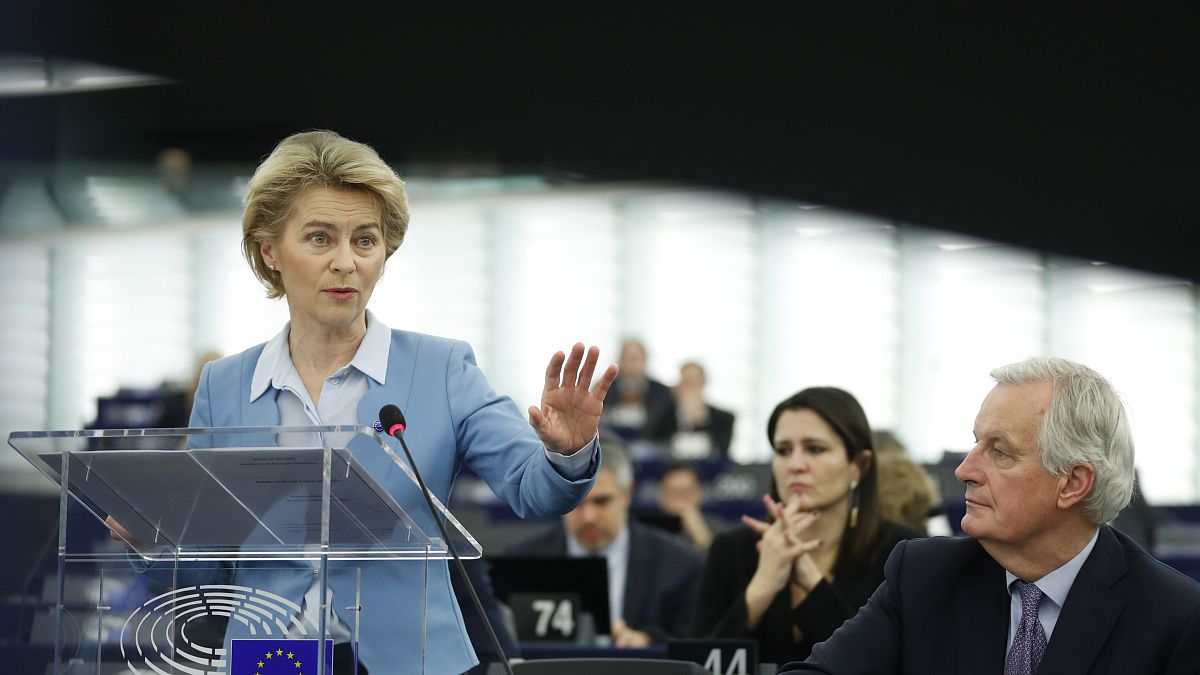The European Commission president addressed the European Parliament’s first post-Brexit session in Strasbourg.
The UK shouldn’t settle for less than an ambitious post-Brexit trade deal with the EU – that was the plea from the European Commission president as she addressed MEPs on Tuesday.
Ursula von der Leyen spoke at the European Parliament’s first plenary session since the British departure from the EU at the end of January.
Data protection, environmental policy and fisheries are just some of the key topics both sides will have to tackle as they negotiate their future relationship.
Since Brexit, they have been setting out their positions ahead of formal talks next month.
The British government appears to want only minimal alignment with EU rules – and it’s not going down very well with EU leaders.
At the European Parliament’s first post-Brexit debate in Strasbourg, von der Leyen described as “music to our ears” Boris Johnson’s recent assertion that the UK would be a “global champion of free trade”. She went on to lay out her vision of the potential new trading relationship.
“Something we have never ever before offered to anybody else: a new model of trade, a unique ambition in terms of access to the single market, but of course this would require corresponding guarantees on fair competition and the protection of social, environmental and consumer standards. In short, this is plain and simply this level playing field," she told MEPs.
The commitment to a “level playing field” was contained in the Political Declaration – the non-binding part of the divorce deal agreed by Boris Johnson’s government with the EU in the autumn.
However, the British prime minister has recently suggested there is no reason for the UK to align to EU rules on state aid, the environment or social policy as part of any trade deal.
Von der Leyen said she was “surprised” to hear Johnson talk about the “Australian model”, his description of the World Trade Organisation (WTO) terms that would kick in should there be no UK-EU trade deal when the transition period expires at the end of the year.
“If this is the British choice, we are fine with that – without any question. But in fact, we are just in the moment where we are agreeing with Australia that we must end this situation, and we work on a trade deal with them. Of course, the UK can decide to settle for less. But I personally believe that we should be way more ambitious,” the commission chief told MEPs.
The Johnson government has ruled out by law an extension to the transition period. But some MEPs doubt a new UK-EU deal can be reached in that time.
As well as trade, a whole host of other post-Brexit issues need to be addressed. Some European lawmakers would like to see further exchanges in the academic field.
“I myself can personally envisage the United Kingdom participating in European research programmes, in European programmes for students which is in fact what British universities, professors and students also demand. But this, of course, costs money, it requires that the UK pays a contribution,” said Siegfried Muresan, a Romanian MEP from the centre-right European People’s Party (EPP).
Also on Tuesday, the EU’s chief negotiator Michel Barnier also addressed the European Parliament, warning that some in the UK “should not kid themselves” that the City of London will get special access to EU markets for financial services.
He dismissed claims by the UK Chancellor (finance minister). Sajid Javid has said agreement on equivalence assessments – acceptance of each other's systems and rules – should be achieved by June.
Negotiations on the post-Brexit relationship are due to start in earnest at the beginning of March. Both sides are setting out their red lines – and for the moment already seem far apart.


